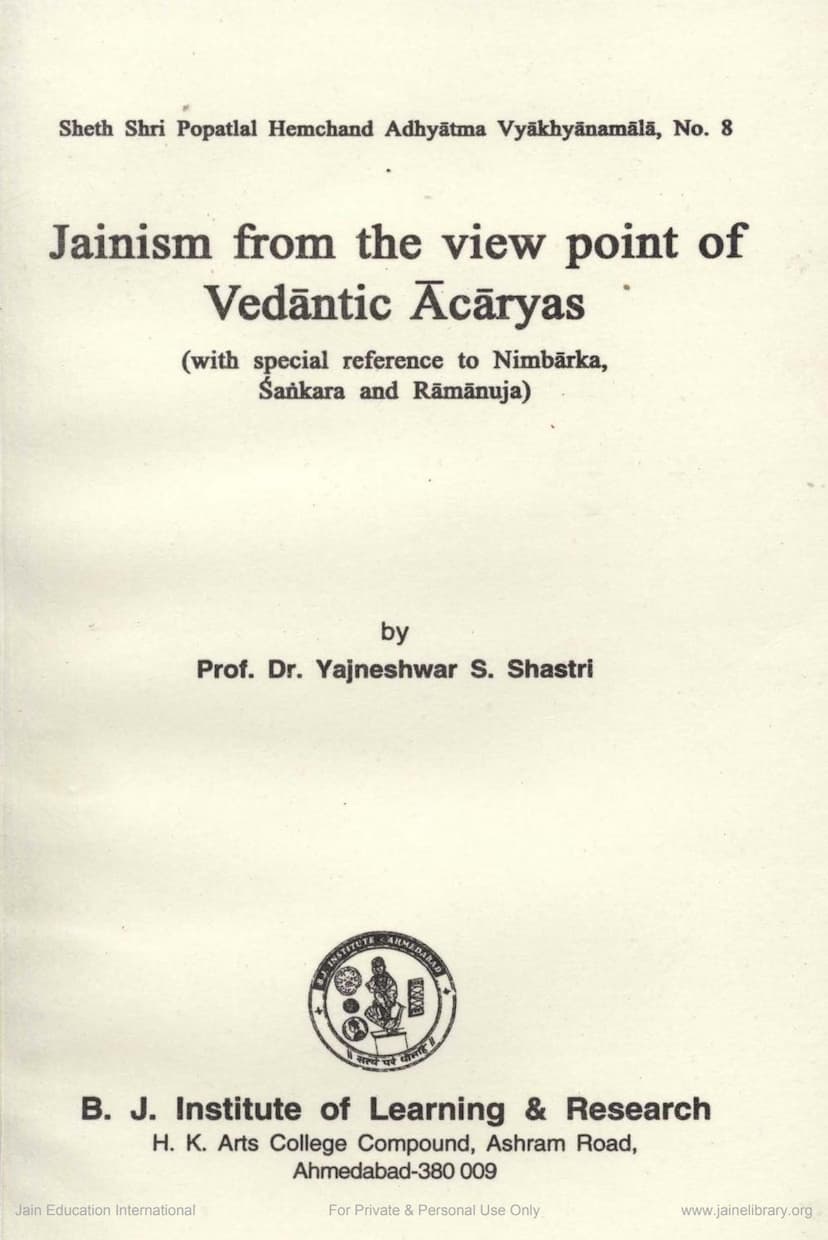Jainism From The View Point Of Vedantic Acaryas
Added to library: September 2, 2025

Summary
This book, "Jainism from the Viewpoint of Vedantic Ācāryas," by Prof. Dr. Yajneshwar S. Shastri, is a scholarly exploration of how prominent Vedanta philosophers, specifically Nimbārka, Śankara, and Rāmānuja, understood and critiqued Jainism. Published by the B. J. Institute of Learning & Research, the work is based on three lectures delivered by the author.
The central thesis of the book is that while Vedantic Ācāryas presented Jainism authentically as a "pūrvapakṣa" (prior view) in their commentaries on the Brahmasutras, their criticisms, particularly of Jainism's core doctrines like Syādvāda (the doctrine of manifold predications or the seven-fold judgment) and Dehaparimāṇavāda (the doctrine that the soul's size is equivalent to the body's size), stemmed from a superficial understanding of these concepts.
Key Themes and Arguments:
-
Jainism's Unique Contribution: Anekāntavāda/Syādvāda: The book highlights Anekāntavāda, encompassing Nayavāda (doctrine of partial viewpoints) and Syādvāda, as Jainism's unique contribution to Indian philosophy. This doctrine is presented as an intellectual expansion of the principle of ahimsā, fostering tolerance and the harmonization of conflicting viewpoints. Anekāntavāda posits that reality is multifaceted, and our understanding is inherently limited and partial. Syādvāda offers a methodology for expressing these multiple facets through a system of conditional predication.
-
Criticism by Vedāntic Ācāryas: The book details the criticisms leveled by Nimbārka, Śankara, and Rāmānuja against these Jain doctrines.
- Syādvāda: The primary criticism revolves around the interpretation of the word 'Syāt.' Vedāntic thinkers often understood 'Syāt' as "perhaps" or "may be," leading them to perceive Syādvāda as a doctrine of doubt or probability. They argued that applying contradictory attributes (like existence and non-existence) to the same entity simultaneously is illogical and violates the law of contradiction. They believed this made the Jaina philosophy uncertain and incapable of providing definite knowledge, rendering the Tirthankaras (Jaina spiritual teachers) as unreliable authorities.
- Dehaparimāṇavāda: This doctrine, which states that the soul's size is contingent on the body it occupies, was also a major point of contention. The Vedantic scholars argued that if the soul's size could change, it would imply impermanence and mutability for the soul, making it subject to destruction and thus rendering concepts like bondage and liberation meaningless. They raised issues like the impossibility of an elephant-sized soul fitting into an ant's body and the implications of parts of the soul entering and leaving.
-
Vedāntic Ācāryas' Presentations: The book emphasizes that despite their criticisms, the Vedāntic Ācāryas presented Jainism's doctrines quite authentically. They did not intentionally misrepresent the faith.
-
Nimbārka's Views: The book dedicates a significant portion to Nimbārka, a less-studied Vedāntic philosopher. It delves into the uncertainty surrounding his dating and works. Nimbārka's commentary (Vedāntapārijātasaurabha) is brief, but his commentator Śrīnivāsa elaborates on Jain doctrines and Nimbārka's criticisms. Nimbārka, like others, criticized Syādvāda based on the impossibility of contradictory attributes coexisting and rejected Dehaparimāṇavāda, advocating for an atomic size for the soul.
-
Śankara's Views: Śankara, the exponent of Advaita Vedanta, provided a detailed and logical critique of both Syādvāda and Dehaparimāṇavāda. He argued that Syādvāda leads to uncertainty and undermines the authority of scripture and teachers. He presented ten arguments against the soul having the size of the body, ultimately favoring the concept of an all-pervading (Vibhu) soul.
-
Rāmānuja's Views: Rāmānuja, the proponent of Viśiṣṭādvaita, also presented Jainism's core principles, including its six substances and the principles of Anekāntavāda and Dehaparimāṇavāda. His criticisms mirrored Śankara's, focusing on the logical inconsistencies of Syādvāda and the impermanence implied by Dehaparimāṇavāda. He also maintained that the soul is atomic in size.
-
Later Vedāntic Thinkers: The book briefly mentions that Vallabhācārya and his followers also criticized Jainism's doctrines, with criticisms similar to the earlier Ācāryas.
-
Jaina Defense of Syādvāda: The latter part of the book focuses on how Jaina philosophers like Samantabhadra, Akalanka, and Vidyānanda responded to these criticisms. They argued that the critiques stemmed from a misunderstanding of the word 'Syāt,' which in Jainism signifies a conditional "yes" or "in a certain respect." They maintained that Syādvāda is not a doctrine of doubt or probability but a method to avoid one-sidedness (ekāntavāda) and to present a comprehensive view of reality by acknowledging its multifaceted nature. They asserted that seemingly contradictory attributes apply to different aspects of an entity or in different contexts, thereby avoiding logical contradiction.
-
The Unanswered Criticism of Dehaparimāṇavāda: A significant observation made by the author is that while Jaina philosophers effectively defended Syādvāda against criticisms, they largely failed to respond to the critiques of Dehaparimāṇavāda leveled by the Vedāntic Ācāryas, particularly Śankara.
In essence, "Jainism from the Viewpoint of Vedāntic Ācāryas" provides a valuable comparative study, illuminating the philosophical dialogue between Jainism and major schools of Vedanta. It highlights the intellectual engagement of these traditions, the points of contention, and the efforts made by both sides to articulate and defend their philosophical positions. The book serves as an important resource for understanding how Jainism was perceived and critiqued within the broader landscape of Indian philosophical thought.